#the more i feel like the show is fundamentally broken
Explore tagged Tumblr posts
Photo
I went and hunted down this article to read, even though the link is dead now, so here it is for anyone else who'd like it. you'll have to scroll a while, or just ctrl+f scott's name
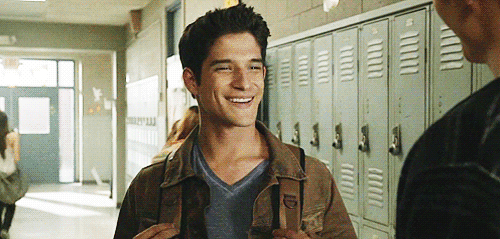
Which is why it’s all the more important to note that Scott? Not your average white teenager. Not a white teenager at all. While the circumstances of Scott’s life are actually probably the result of the writers trying to create a scenario where it’s plausible for a sixteen year old boy to spend most of his nights running around the woods fighting monsters, the facts remain the same.
Scott’s parents are divorced, and at the start of the show at least, his father is completely out of the picture. It is implied several times that his father was an alcoholic, and borderline abusive. Scott’s mother, on the other hand, is a genuinely amazing and wonderful woman, but she’s busy providing for her teenage son (and the occasional love-starved foster kid that her son literally brings home to live with them because that is an honest to goodness plot point). Melissa (played by Melissa Ponzio) is a fantastic mother, but she’s not around a lot, because she’s always working. She’s a nurse, and while it’s a profession that pays pretty well, it’s clear that it doesn’t pay well enough.
And, I mean, I just can’t get over how interesting Scott’s background is from this perspective. Because his father, who we later discover is an FBI agent, is a codedly upper-middle class white man, but Scott chooses to live with his working class Hispanic mother. Nursing, though an important (very) and difficult job, is generally considered a lower-class profession. It’s something working class people do. Higher income people with the same interests become doctors.
It’s hard to think of a more positive representation of a Hispanic teen in pop culture. It’s hard to think of a more positive representation of any teenager in pop culture. Scott’s one of a kind. Because while he is a rather static character (he is good and he stays good), Scott isn’t by any means boring, nor is he a bad character. Like I mentioned earlier, he’s a lot like Captain America. Just because he’s good doesn’t mean everyone else is, and a great deal of really interesting conflict can come from Scott and his idealism butting up against the world.
from “The Inescapable Goodness of Scott McCall” on Kiss My Wonder Woman
#teen wolf#it's not that it's an astonishingly good article or anything it's just since I did find a link#I figured I'd share#tldr of the article is 'he's a fundamentally good person in a way that's refreshing in a show like this#and especially refreshing for a hispanic character from a ~broken home~ etc'#and that this fundamental goodness makes the show more interesting & compelling#bc instead of giving him anti-hero style gray morality qualms#the narrative has to work around his unassailable kindness and boundless capacity for love#this article is also the first time anyone has expressed a positive feeling toward s3 that I have seen#even obliquely#in that it said s2 was universally agreed on as the worst season#so I am very slightly tempted to try watching past s2 after all someday
18K notes
·
View notes
Text
Saw a fun little conversation on Threads but I don't have a Threads account, so I couldn't reply directly, but I sure can talk about it here!
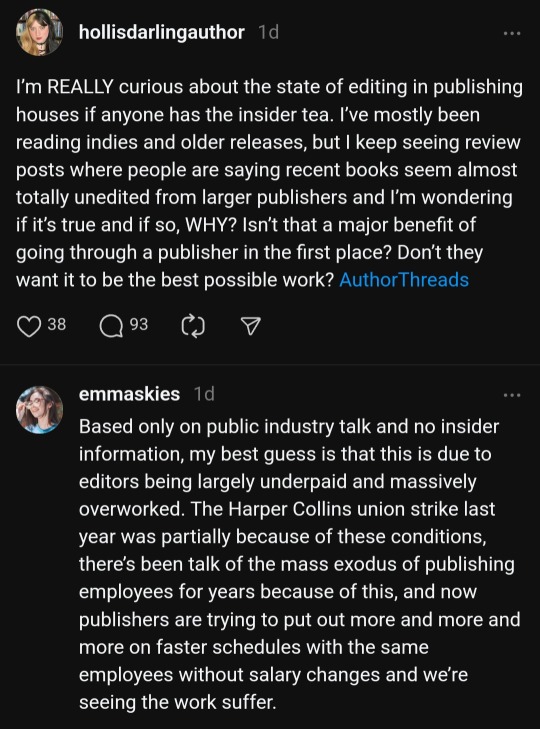
I've been wanting to get into this for awhile, so here we go! First and foremost, I wanna say that "Emmaskies" here is really hitting the nail on the head despite having "no insider info". I don't want this post to be read as me shitting on trad pub editors or authors because that is fundamentally not what's happening.
Second, I want to say that this reply from Aaron Aceves is also spot on:
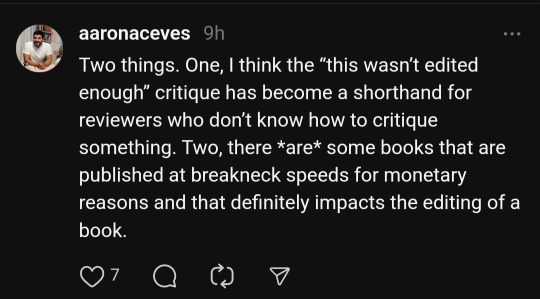
There are a lot of reviewers who think "I didn't enjoy this" means "no one edited this because if someone edited it, they would have made it something I like". As I talk about nonstop on this account, that is not a legitimate critique. However, as Aaron also mentions, rushed books are a thing that also happens.
As an author with 2 trad pub novels and 2 trad pub anthologies (all with HarperCollins, the 2nd largest trad publisher in the country), let me tell you that if you think books seem less edited lately, you are not making that up! It's true! Obviously, there are still a sizeable number of books that are being edited well, but something I was talking about before is that you can't really know that from picking it up. Unlike where you can generally tell an indie book will be poorly edited if the cover art is unprofessional or there are typoes all over the cover copy, trad is broken up into different departments, so even if editorial was too overworked to get a decent edit letter churned out, that doesn't mean marketing will be weak.
One person said that some publishers put more money into marketing than editorial and that's why this is happening, but I fundamentally disagree because many of these books that are getting rushed out are not getting a whole lot by way of marketing either! And I will say that I think most authors are afraid to admit if their book was rushed out or poorly edited because they don't want to sabotage their books, but guess what? I'm fucking shameless. Café Con Lychee was a rush job! That book was poorly edited! And it shows! Where Meet Cute Diary got 3 drafts from me and my beta readers, another 2 drafts with me and my agent, and then another 2 drafts with me and my editor, Café Con Lychee got a *single* concrete edit round with my editor after I turned in what was essentially a first draft. I had *three weeks* to rewrite the book before we went to copy edits. And the thing is, this wasn't my fault. I knew the book needed more work, but I wasn't allowed more time with it. My editor was so overworked, she was emailing me my edit letter at 1am. The publisher didn't care if the book was good, and then they were upset that its sales weren't as high at MCD's, but bffr. A book that doesn't live up to its potential is not going to sell at the same rate as one that does!
And this may sound like a fluke, but it's not. I'm not naming names because this is a deeply personal thing to share, but I have heard from *many* authors who were not happy with their second books. Not because they didn't love the story but because they felt so rushed either with their initial drafts or their edits that they didn't feel like it lived up to their potential. I also know of authors who demanded extra time because they knew their books weren't there yet only to face big backlash from their publisher or agent.
I literally cannot stress to you enough that publisher's *do not give a fuck* about how good their products are. If they can trick you into buying a poorly edited book with an AI cover that they undercut the author for, that is *better* than wasting time and money paying authors and editors to put together a quality product. And that's before we get into the blatant abuse that happens at these publishers and why there have been mass exoduses from Big 5 publishers lately.
There's also a problem where publishers do not value their experienced staff. They're laying off so many skilled, dedicated, long-term committed editors like their work never meant anything. And as someone who did freelance sensitivity reading for the Big 5, I can tell you that the way they treat freelancers is *also* abysmal. I was almost always given half the time I asked for and paid at less than *half* of my general going rate. Authors publishing out of their own pockets could afford my rate, but apparently multi-billion dollar corporations couldn't. Copy edits and proofreads are often handled by freelancers, meaning these are people who aren't familiar with the author's voice and often give feedback that doesn't account for that, plus they're not people who are gonna be as invested in the book, even before the bad payment and ridiculous timelines.
So, anyway, 1. go easy on authors and editors when you can. Most of us have 0 say in being in this position and authors who are in breech of their contract by refusing to turn in a book on time can face major legal and financial ramifications. 2. Know that this isn't in your head. If you disagree with the choices a book makes, that's probably just a disagreement, but if you feel like it had so much potential but just *didn't reach it*, that's likely because the author didn't have time to revise it or the editor didn't have time to give the sort of thorough edits it needed. 3. READ INDIE!!! Find the indie authors putting in the work the Big 5's won't do and support them! Stop counting on exploitative mega-corporations to do work they have no intention of doing.
Finally, to all my readers who read Café Con Lychee and loved it, thank you. I love y'all, and I appreciate y'all, and I really wish I'd been given the chance to give y'all the book you deserved. I hope I can make it up to you in 2025.
4K notes
·
View notes
Text
One thing that I absolutely love about TFOne's writing is that it manages to avoid a lot of the heavier criticism I've seen regarding MegOp's hero/villain dynamic over the years (trust me, the mid-2010s TF discourse was crazy)
*Spoilers Below*
First of all, the narrative benefits so much from the main 4 cast members all being a part of the same exploited mining class. So many takes on MegOp have Orion being of a higher status (an archivist, a cop, etc) while Megatron is much lower down on the social latter (a miner, a gladiator, often in the context of being a slave).
I've seen many people be put off by this, because it feels as if Megs is being villianized for being rightfully angry at the system that deeply harmed and exploited him, while Orion/Optimus is praised for taking a more pacifistic stance despite him not suffering as much from or in some ways even benefiting from the system he claims to oppose. I don't find their dynamic to be as simple as that, and I do find these takes to be a bit reductive, but I do very much see where they are coming from.
I am definitely one of those people who's very frustrated with the way pacifism is hailed as the one true path of morality, and the inherent implication that taking any sort of revenge on the people who abused/exploited you makes you just as bad as them. Also, Marvel's particular brand of demonizing any form of radical political action, despite the system clearly being broken and corrupt, but being completely unwilling to offer any other alternatives to meaningfully change things for the better.
When looking at what I described above its pretty easy to see how a lot of versions of MegOp's hero/villain dynamic unfortunately fits into that trope. Bringing it back to TFOne, you can see how Op and Meg coming from the same political/social status subverts this. The existence of Elita and Bee only further illustrates that out of the 4 people of the mining class who were all deceived, exploited, and literally mutilated in the same way it is only D-16 that completely loses himself to his rage, even to the point where he loses compassion for his own companions and disregarding the safety of the other miners (when he decides to "tears everything down" and Elita exclaims he's going to "kill everyone").
What I think I love most about the characterization in TFOne is that Orion is the radical one. Not only that, but he is praised by Elita and by extension the narrative for it. He is constantly challenging authority, and is the first to have the suspicion that their society is structured in an unjust way.
Meanwhile D-16, to be frank, is kind of a bootlicker. He fully believed in the system and that Sentinal Prime, as someone with power, had the right to decided "what was best" for those who are weaker/lesser (I wish I had the specific quote from D-16 to support this, but the movie's still in theaters). It illustrate that D-16 already held certain fascistic ideals, and that he and Orion already have fundamentally opposing moral/political values, it simply hasn't been of any consequence yet. It shows that their eventual falling out was inevitable, even if they had decided to rebuild Cybertron together.
It should also be noted that D-16's feelings of anger and betrayal do not necessarily have anything to do with the unjust system itself, but that said unjust system was predicated on a lie. Hence his fixation on deception in the post-credits scene and him naming his faction the Decepticons. Meanwhile, when Orion learns the truth he's just sort of like "yeah, I always kinda knew something was up" because again, he understood on some level that their system was predicated on injustice.
Even D-16's obsession with Megatronus Prime, while initially an endearing aspect of his character, is also an indicator of the questionably large amount of value he puts on one's strength. It foreshadows the "might makes right" ideology that the decepticons follow, and is a key part of their ideological characterization across continuities.
Instead of the narrative we often see in Transformers media were Optimus is idolized by the narrative for being more moderate and Megatron is villiainized for being radical (or so people often claim), it is instead Optimus who is rewarded and praised by the narrative for being radical, and Megatron who is villainized and punished by the narrative for holding potentially fascistic values.
I do agree with some criticism I've seen that the whole thing with killing Sentinel and D-16's final turn into villainy felt a bit rushed and more than a little cliche, but I also understand it both had a limited runtime and that it is ultimately a family film meant to be accessible to children. More importantly though, I think the movie set the groundwork early on that, no matter how this final act played out, D-16 was always going to turn to darkness, and Orion would not have been able to stop him.
Its perfectly tragic, the way all MegOp should be, while also feeling really well thought out from a thematic standpoint. I love it.
#transformers#tf#tfone#transformers one#orion pax#megatron#d-16#optimus prime#maccadam#megop#megatron x optimus prime#kaysposts
878 notes
·
View notes
Text
As much as nearly every character she meets tends to act like there's something uniquely broken and wrong with Claudia, at no point does it truly seem to me like there actually really is? I mean, obviously she is extremely fucked up, she straight up went through a serial killer collecting trophies phase, but there's a level of fucked up that's sort of the baseline for every character in the show, and obviously being turned into a vampire as a child puts her at a unique disadvantage. But for all that everyone around her spends their time bemoaning how dreadful and doomed her life is, even Louis who genuinely loves her but also builds so much of his identity around feeling responsible for her Terrible Fate™, I really don't think she's like, fundamentally damaged any more than any of the other vampires are.
But Lestat is so unwilling to be wrong that every time her life hits an inevitable road bump instead of helping her through it he points and says "look! see! she IS a monster, I was right Louis, making her was a mistake!" (and I think he sees his own monstrousness in her but fails to also see her humanity)
And then Armand meets her and sees only someone who will inevitably lose her mind, so of course speeding up the "inevitable" and siding with the coven to plan her death is just a mercy, absolving himself of any blame. (and he projects his own frailty and desire for death onto her, failing to see her strength and her desire for life)
Which makes it so cathartic when she meets Madeleine, admits to her how broken she feels sometimes, and Madeleine's response is just. Well that's normal. Who isn't a little broken these days. Let yourself feel it, move on, let yourself feel it again if you need to. After spending her life having others act as if her emotions are something uniquely dark and worrying, Madeleine's incredibly blase attitude must have been such an incredible breath of fresh air for Claudia!
To spend her whole life being made to feel like something is Wrong™ with her, and then meet someone who's just like, "yeah, and?? Who isn't? Join the club I guess"
Which makes her death so incredibly tragic and frustrating because like. She was fine! She was making a life for herself! She wasn't doomed by her nature, she wasn't "doomed by the narrative" (whatever the fuck that even means), she was doomed for no reason other than that everyone around her (except for Madeleine) preemptively DECIDED she was doomed and never gave her a chance to prove them wrong.
#interview with the vampire#claudia iwtv#claudia de pointe du lac#claudia eparvier#(just using all the possible last names for the sake of thorough tagging lol)#there's also a very interesting layer of like#disability metaphor in claudias story#with her just living her life as best she can#despite a physical disadvantage#that makes the world perceive her as both childlike and unsettling#and others see this as a terrible fate worse than death#meanwhile she's just#living her life#she could have lived a full and good life (by vampire standards) if others hadn't decided that she couldn't/shouldn't
783 notes
·
View notes
Text
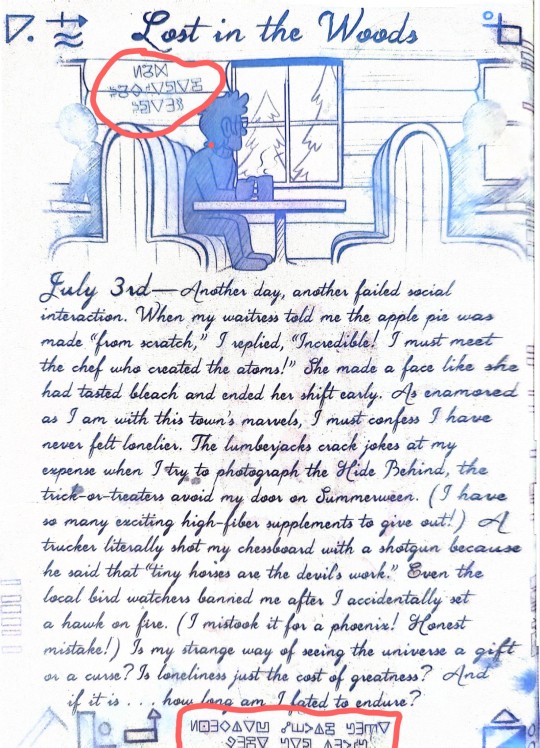
This is such a telling page for Ford. Not only does he detail his social missteps and admit to being lonely in Gravity Falls, despite the scientific wonder of the place, but he also uses what I call "Fordese 2," a scrambled version of the "Fordese 1" code we were first introduced to in Journal 3 to label himself a "six-fingered freak" and to state that "Stanley would have made her laugh." (Her, being the waitress Ford tries out his nerdy science joke on, which goes down like a lead balloon despite the fact that it is legitimately funny, given the right audience).
It's like Bill says. "Ego of a king. The insecurity of a circus freak. And totally isolated..." (Funny enough, Bill could probably turn those exact words on himself, as well.)
Ford so wanted Gravity Falls to be the place where he'd finally fit in, the puzzle to his misshapen puzzle piece.
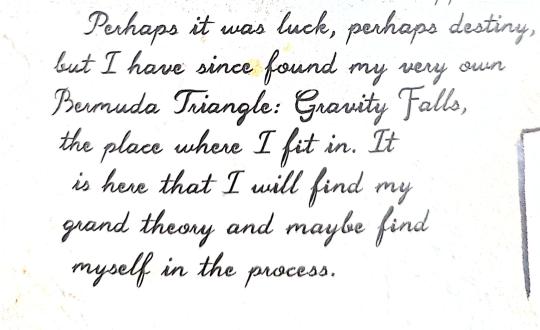
And as we see in the missing Journal pages from BoB, that was not to be the case. And worst of all? Ford blames it on his hands at first, but the reality is that he says that "Stanley could make her laugh," meaning Ford's "freakishness" (as he would put it) has less to do with his six fingers and much more to do with Ford's personality and the way he interacts with others.
This is actually worse. Fingers, you can fix, if you want to. By the time you're an adult, most people probably wouldn't care. But to Ford, his fingers seem to be more a manifestation of something internal, something he feels is fundamentally broken about him and that's just the absolute worst hell to be stuck in.
So yeah, it's hardly surprising Ford fell so hard for Bill's shenanigans (and you can define "fell so hard" however you want, although that karaoke page in BoB is especially damning). Here's an interdimensional being who not only can guide you to unlocking the secrets of the universe and propel you towards scientific fame and glory (and thus shoving every taunt, invective, side-eye, and eye roll ever hurled at you over the decades down your tormentors' throats) - but he's (on the surface) completely glib about being a freak himself.
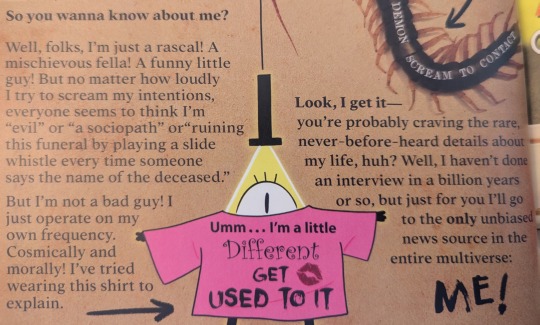
For Ford, this must have been like finding a shady, sparkling oasis after thirty years of trawling through the desert (especially after Stanley's "betrayal" - Stanley, who along with Fiddleford, being the only person Ford felt like he could be himself around and still be accepted as a human being).
Now, is Bill trying way too hard to show how much he doesn't care? Uhhh, yeah. Bill has almost the same hangups as Ford. Labeled a freak for a genetic mutation and ostracized by his peers. Has a rare gift in that he can see not only into the third dimension but can see even past that, into possible dimensions and futures, which is a wild skill to have. Compare this with Ford's gigantic science brain and academic overachievement. Same deal. And not only this! Bill, in an attempt to prove what he can do with his "freakishness," to prove his worth and place in the universe - he tries to show off something to the denizens of his dimension (we don't know yet what Bill did), only to end up slaughtering his entire dimension. Ford was a hair's breath away from doing the exact same thing with the portal. Because we know from Journal 3 that part of his motivation is to be famous and get accolades for his work, and that maybe "girls will finally talk to me." (Which, Fordsy, let's be real here - I don't think you're actually into these "girls" for real, but you want the acceptance that comes with fitting in with societal standards, and getting a state-sanctioned girlfriend is exactly the type of thing Ford would want to make himself feel "normal.")
Anyway, the point being that if Ford had succeeded with his initial portal attempt, he would have basically wiped out his own dimension. Just. Like. Bill. And it makes you wonder - yeah, yeah, Bill wanted to party, Bill needed out of the Nightmare Realm, Bill's a psychopath who enjoys destruction.
But honestly? I think part it all was that Bill wanted someone like him. His own puzzle piece. Another monster. A being whose collateral damage in the quest to justify their existence in this universe ends in wholesale slaughter.
And Ford had the capacity to easily fit that mould.
#hello there#book of bill spoilers#stanford pines#bill cipher#i could go on and on about ford's hangups and his leaky morals that are definitely tied to his self esteem issues#it's fucking tragic but GODS is he a great layered character#both him and his brother there is so much to explore there it is TASTY#also i fully believe ford had the capacity to be evil!ford if a few things had gone differently in his timeline#and that when bill looked into those futures A LOT of them ended with ford blowing up his own dimension
632 notes
·
View notes
Text
against the logic of the lawn
Imagine a box.
This box is sealed with tape or adhesive, which shows you that it has never been opened or re-used. It is in pristine condition. Apart from that, the box could hold anything. It could contain a Star Wars Funko Pop, a printer, a shirt ordered from some sketchy online vendor, a knockoff store-brand cereal, six individually wrapped protein bars.
As a Consumer ("the" Consumer) this is your fundamental right: To purchase a box that is, presumably, identical to every other box like it.
When you Buy Product, it arrives in a box, entire of itself and without context. It has not changed since its creation. If and when Product does change—whether it is broken, spoiled, used up, or eaten—you can Buy Product that is identical in every meaningful way to the original.
It's okay if this doesn't make sense yet. (You can stop imagining the box now.)
Imagine instead a suburban housing development, somewhere in the USA.
Imagine row on row of pristine, newly built houses, each constructed with small, meaningless variations in their aesthetic, all with beige or white vinyl siding and perhaps some decorative brick, all situated on identical rectangles of land covered with freshly unrolled sod. This is the Product that every consumer aspires to Buy.
I am not exactly—qualified, or entitled, to speak on the politics of land ownership in this country. My ancestors benefited directly from the genocide of Native Americans, which allowed Europeans to steal the land they lived on, which is where a lot of wealth comes from in the end, even today. However, I have eyes in my head to see that the act of colonizing a continent, and an economic system that formed as a supporting infrastructure to colonization, have embedded something almost irreparably dysfunctional into the dominant American culture's relationship to land.
This dysfunctional Thing, this Sickness, leads us to consider land to be a Product, and to consider a human upon the land to be a Consumer.
From this point of view, land is either locked into this relationship of control and "use" to varying extents, or it is free of human influence. People trying to reason about how to preserve Earth's biosphere, working within this framework without realizing, decide that we must "set aside" large areas of land for "nature."
This is a naive and, I would reckon, probably itself colonialist way of seeing things. It appears to be well-validated by evidence. Where human population is largest, there is less biodiversity.
But I find the broad conclusions to be strikingly unscientific. The plan of "setting aside part of Earth for nature" displays little curiosity about the mechanisms by which human presence impacts biodiversity. Otherwise intelligent people, perhaps caught up in the "bargaining" phase of climate grief, seem taken in by the idea that the human species gives off a magical anti-biodiversity force field, as if feeling guiltier will fix the problems.
(Never mind that lands managed by indigenous folk actually have MORE biodiversity...almost like our species' relationship to the planet isn't inherently exploitative, but rather, the capitalist and colonialist powers destroying everything.......)
Let's go back to the image of the new housing development. This image could be just about anywhere in the USA, because the American suburban home is made for universal interchangeability, where each little house and yard is static and replaceable with any other.
Others have written about the generic-ification of the interiors of homes, how houses are decorated with the most soul-killing, colorless furnishings to make them into Products more effectively. (I think @mcmansionhell wrote about it.)
This, likewise, is the Earth turned into a Product—razed down into something with no pre-existing context, history, or responsibility. Identical parcels of land, identical houses, where once there was a unique and diverse distribution of life. The American lawn, the American garden, the industry that promotes these aesthetics, is the environmental version of that ghastly, ugly "minimalism" infecting the interiors of homes.
The extremely neat, sparse, manicured look that is so totally inescapable in American yards originated from the estates of European aristocracy, which displayed the owner's wealth by flaunting an abundance of land that was both heavily managed and useless. People defend the lawn on the basis that grass tolerates being walked upon and is good for children to play, but to say this is *the* purpose of a lawn is bullshit—children are far more interested in trees, creeks, sticks, weeds, flowers, and mud than Grass Surface, many people with lawns do not have children, and most people spend more time mowing their lawn than they do doing literally anything else outside. How often do you see Americans outside in their yards doing anything except mowing?
What is there to do, anyway? Why would you want to go outside with nothing but the sun beating down on you and the noise of your neighbors' lawn mowers? American culture tries to make mowing "manly" and emphasizes that it is somehow fulfilling in of itself. Mowing the lawn is something Men enjoy doing—almost a sort of leisure activity.
I don't have something against wanting a usable outdoor area that is good for outdoor activities, I do, however, have something against the idea that a lawn is good for outdoor activities. Parents have been bitching for decades about how impossible it is to drag kids outdoors, and there have been a million PSAs about how children need to be outside playing instead of spending their lives on video games. Meanwhile, at the place I work, every kid is ECSTATIC and vibrating with enthusiasm to be in the woods surrounded by trees, sticks, leaves, and mud.
The literal, straightforward historical answer to the lawn is that the American lawn exists to get Americans to spend money on chemicals. The modern lawn ideal was invented to sell a surplus of fertilizer created after WW2 chemical plants that had been used to make explosives were repurposed to produce fertilizer. Now you know! The more analytical, sociological answer is that the purpose of the lawn is to distance you from the lower class. A less strictly maintained space lowers property values, it looks shabby and unkempt, it reflects badly on the neighborhood, it makes you look like a "redneck." And so on. The largest, most lavish McMansions in my area all have the emptiest, most desolate yards, and the lush gardens all belong to tiny, run-down houses.
But the answer that really cuts to the core of it, I think, is that lawns are a technology for making land into a Product for consumers. (This coexists with the above answers.) Turfgrass is a perfectly generic blank slate onto which anything can be projected. It is emptiness. It is stasis.
I worry about the flattening of our imaginations. Illustrations in books generally cover the ground outdoors in a uniform layer of green, sometimes with strokes suggesting individual blades of grass if they want to get fancy. Video games do this. Animated shows and movies do this.
Short, carpet-like turfgrass as the Universal Outdoor Surface is so ubiquitous and intuitive that any alternative is bizarre, socially unacceptable, and for many, completely unimaginable. When I am a passenger in a car, what horrifies me the most to see out the window is not only the turfgrass lawns of individuals, but rather, the turfgrass Surface that the entire inhabited landscape has been rendered into—vacant stretches of land surrounding businesses and churches, separating parking lots, bordering Wal-Marts, apartment complexes, and roadsides.
These spaces are not used, they are almost never walked upon. They do nothing. They are maintained, ceaselessly, by gas-powered machines that are far, far more carbon-emitting than cars per hour of use, emitting in one hour the same amount of pollution as a 500-mile drive. It is an endless effort to keep the land in the same state, never mind that it's a shitty, useless state.
Nature is dynamic. Biodiversity is dynamic. From a business point of view, the lawn care industry has found a brilliant scheme to milk limitless money from people, since trying to put a stop to the dynamism and constant change of nature is a Sisyphean situation, and nature responds with increasingly aggressive and rapid change as disturbance gets more intense.
On r/lawncare, a man posted despairingly that he had spent over $1500 tearing out every inch of sod in his yard, only for the exact same weeds to return. That subreddit strikes horror in my heart that I cannot describe, and the more I learn about ecology, the more terrible it gets. It was common practice for people in r/lawncare to advise others to soak their entire yard in Roundup to kill all plant life and start over from a "blank slate."
Before giving up, I tried to explain over and over that it was 100% impossible to get a "blank slate." Weeds typically spread by wind and their seeds can persist for DECADES in the soil seed bank, waiting for a disastrous event to trigger them to sprout. They will always come back. It's their job.
It was impossible for those guys to understand that they were inherently not just constructing a lawn from scratch, and were contending with another power or entity (Nature) with its own interests.
The logic of the lawn also extends into our gardens. We are encouraged to see the dynamism of nature as something that acts against our interests (and thus requires Buy Product) so much, that we think any unexpected change in our yard is bad. People are sometimes baffled when I see a random plant popping up among my flowers as potentially a good thing.
"That's a weed!" Maybe! Nonetheless, it has a purpose. I don't know who this stranger is, so I would be a fool to kill it!
A good caretaker knows that the place they care for will change on its own, and that this is GOOD and brings blessings or at least messages. I didn't have to buy goldenrod plants—they came by themselves! Several of our trees arrived on their own. The logic that sees all "weeds" as an enemy to be destroyed without even identifying ignores the wisdom of nature's processes.
The other day at work, the ecologist took me to see pink lady's slipper orchids. The forest there was razed and logged about a hundred years ago, and it got into my head to ask how the orchids returned. He only shrugged. "Who knows?"
Garden centers put plants out for sale when they are blooming. People buy trees from Fast Growing Trees dot com. The quick, final results that are standard with Buy Product, which are so completely opposite the constant slow chaos of nature, have become so standard in the gardening world that the hideous black mulch sold at garden centers is severed from the very purpose of mulch, and instead serves to visually emphasize small, lonely plants against its dark background. (For the record, once your plants mature, you should not be able to SEE the mulch.)
Landscapers regularly place shrubs, bushes, trees and flowers in places where they have no room to reach maturity. It's standard—landscapers seem to plan with the expectation that everything will be ripped out within 5-10 years. The average person has no clue how big trees and bushes get because their entire surroundings, which are made of living things (which do in fact feel and communicate) are treated as disposable.
Because in ten years, this building won't be an orthodontists' office, in ten years, this old lady will be dead, in ten years, the kids will have grown, and capitalism is incapable of preparing for a future, only for the next buyer.
The logic of the lawn is that gardens and ecosystems that take time to build are not to be valued, because a lush, biodiverse garden is not easily sold, easily bought, easily maintained, easily owned, or easily treated with indifference. An ecosystem requires wisdom from the caretaker. That runs contrary to the Consumer identity.
And it's this disposable-ness, this indifference, that I am ultimately so strongly against, not grass, or low turf that you can step on.
What if we saw buying land as implying a responsibility to be its caretaker? To respect the inhabitants, whether or not we are personally pleased by them or think they look pretty? What creature could deserve to be killed just because it didn't make a person happy?
But the Consumer identity gives you something else...a sense of entitlement. "This is MY yard, and that possum doesn't get to live there." "This is MY yard, and I don't want bugs in it." "This is MY yard, and I can kill the spiders if I want to."
Meanwhile there is no responsibility to build the soil up for the next gardener. No responsibility to plant oaks that will grow mighty and life-giving. No responsibility to plant fruit-producing trees, brambles, and bushes. None of these things, any of which could have fulfilled a responsibility to the future. Rather, just to do whatever you damn well please, and leave those that come after with depleted, compacted soil and the aftermath of years of constant damage. It took my Meadow ten years to recover from being the garden patch of the guy that lived here before us. Who knows what he did to it.
The loss of topsoil in all our farmland is a bigger example, and explains how this is directly connected to colonialism. The Dust Bowl, the unsustainable farming practices that followed, the disappearance of the lush fertile prairie topsoil because of greed and colonizer mindset, and simple refusal to learn from what could be observed in nature. The colonizing peoples envisioned the continent as an "Empty" place, a Blank Slate that could be used and exploited however.
THAT is what's killing the planet, this idea that the planet is to be used and abused and bought and sold, that the power given by wealth gives you entitlement to do whatever you want. That "Land" is just another Product, and our strategies for taking care of Earth should be whatever causes the most Buy Product.
It's like I always write..."You are not a consumer! You are a caretaker!"
#plants#native plants#no lawns#kill your lawn#anti lawn#consumerism#capitalism#colonialism#genocide tw
2K notes
·
View notes
Text
Ford's autism
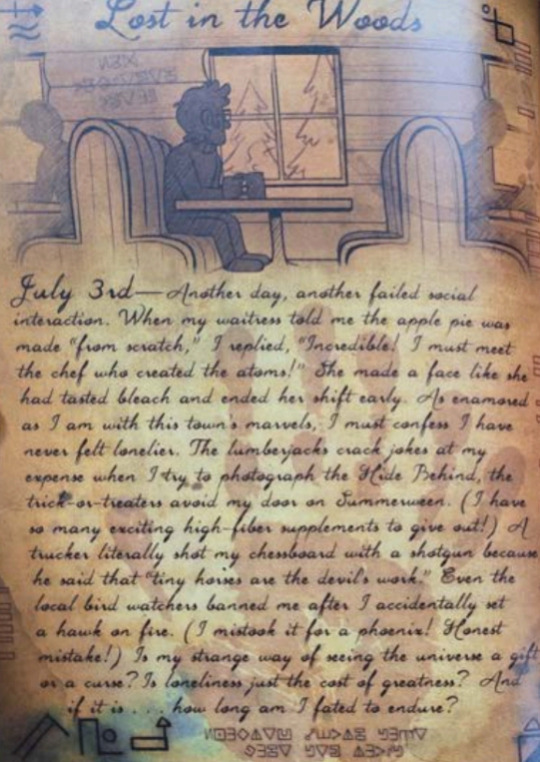
K so I don't think I need to defend the interpretation Ford is on the spectrum. People make jokes about him being autistic all the time. We all see it. What I want to do here is sort of connect together some character details and examine them through the lense of my own autistic experiences.
I wanna start with his hands. It's an observation I've seen from multiple people that Ford is insecure about his hands and often hides them behind his back or in his pockets. And yeah, he is obviously insecure about them. He even mentions his six fingers at times when they aren't really relevant to anything. It just showcases the space this physical deviation of his takes up in his mind. And yes, it makes sense that he's insecure about them because he was bullied for them growing up. I want to add to this observation.
Ford would have been bullied regardless.
The problem was never really his hands. When you're on the spectrum people around you can tell that you're weird. Uncanny. Something is different and feels wrong about you to NT people, especially kids. They will pick any shallow superficial thing they can find as an excuse to bully you and justify the sense of revulsion they feel around you but can't articulate. If Ford had been born with normal hands they just would have made fun of him for something else, it would have been his glasses, or the movies he liked, or hell maybe some good old-fashioned antisemitism. Literally, any excuse they could find.
I know growing up I tried for years to change the things about me that I was made fun of for and it never made things any better. The bullying never stopped. "Fixing" things about myself didn't work because the thing that was actually "broken" was something fundamental to who I am. That realization as a kid was soul-crushing. That there was nothing I could do that would ever make me "normal", that would ever make people like me. I felt like an alien born on the wrong planet.
Ford continues to latch onto his hands as a sore spot because they're something simple and obvious he can point to as an excuse for why he's so outcast. He probably knows by this point that the hands aren't actually the problem. I'd argue this journal entry and his comment about "another failed social interaction" shows that he's aware his hands aren't actually the problem. But, it is a lot easier to fixate on those than to dwell directly on that sinking feeling that at the core of you're being you are fundamentally weird, wrong, unlovable. Ford's a genius. If his polydactyly bothered him that much he could have removed the extra digits. The hands aren't the problem, they're a symbol of a more fundamental kind of pain.
Looking at it through this context also makes the gloves Fiddleford gives him an extra sweet gift given what they represent. A kind of wholehearted acceptance of who Ford is and even a willingness to adapt to his unique needs just to show him love and affection. I think something that hurts me so much about their relationship is that Ford had someone who very clearly loved him as is and would have never wanted him to be someone or something else, and Ford was too stubborn to fully appreciate that.
The same is true of Stanely by the by. He never had a problem with his brother being weird. Another relationship with someone who loved Ford as is but who Ford took for granted. He needs these kinds of relationships in his life. People who embrace and accept him for the weirdo he is. He needs them desperately, which gets me to my next point.
Ford's ego. So it's also a common observation that Ford has a massive ego. He's kind of an ass, to put it mildly. But I have had someone in conversation frame it like the pressure to prove themselves was just on Stanley and Ford just spent his whole life being hyped up and told he was hot shit. This isn't true, or at least it's a flattening of his experiences.
Ford was praised for his genius. This is true. But his own father only gave a shit when said genius showed signs of netting material gains for the family. It only mattered cause Ford could be useful. Furthermore, this genius never netted him social acceptance from his peers growing up. He was still a bullied, weirdo, loser most of his childhood. Add that seeing Stanley kicked out would have drilled into Ford's head that if he couldn't make something out of himself his family wouldn't want him either. Stan was an unspoken threat of what this family does to failures.
Gonna bring up my own personal experiences again. Having set the stage for how it feels growing up on the spectrum. That feeling of alienness that you can't really explain. I loved to write and draw from a very young age. Moreover, as I got older I realized that when I drew, people were nice to me. The only time I got social acceptance was when people were admiring or praising me for my art. So I did it more and more, I devoted myself feverishly to my art. I loved it anyway and would have hyper-fixated on it regardless but the positive reinforcement turned art from something I loved to a need. I NEEDED to be an artist. I needed to be the best at my school. I needed all eyes on my work because it was the only way I could make friends. The only way I could prove that I had value. That I deserved a place in society.
I see that in Ford. I see his ego not as shallow narcissism but as an overwhelming need to prove his value as a person. To be loved and accepted and believing that no one will want him if he isn't brilliant. If he doesn't change the world. If he isn't useful. This is also why he couldn't bring himself to destroy his research even knowing it was the safest and most responsible option. Burning down everything he worked for would mean finally giving up on the fantasy of ever being accepted or valuable.
The sad thing is he's so single-mindedly fixated on this personal goal of proving his worth to the world that when people do come along that love him unconditionally he takes them for granted. These people are statistical anomalies in his life. Nice to have around, but not enough to fix the bigger problem. They aren't reflective of society at large. They aren't enough to prove that he, personally, is loveable. Just that on occasion he meets another weirdo. For a while it's nice. Like a campfire in a barren tundra. But he has to keep moving, he can't stay. Warmer lands are ahead if he can just get to them. If he can just keep moving.
This also is why Ford was so susceptible to Bill. Bill told Ford what he wanted to hear. That he was destined for greatness. That, the fundamental wrongness he felt all his life was something incredible other people just couldn't see. Bill promised Ford exactly what he wanted, but not what he actually needed. Ford never needed the world at large to accept him. He just needed a few good people.
I also think his chemistry with Bill was connected to his autistic experiences as well. Bill is literally an alien. There's no pressure to mask around him. To try and "act normal". Ford can just be himself with Bill and not have to think about it. And sure, he could be himself around Fiddleford, but Fidds is still human. The anxieties of human social expectations are still present. Like when Fidds get him a gift for the holidays and Ford feels a bit guilty that it didn't even occur to him to do the same. He doesn't have to think about these social nuances with Bill.
That said I'm sure Bill isn't what his world would have considered neurotypical anyway. Not that Ford would know that. But Bill was also a strange freak in his own society. Just as outcast, possibly more so. I think Bill sees a bit of his own experiences reflected in Ford. I think he relates to him on a level. Not that he would ever admit it outright due to his own ego. I think Bill's fixation on him after the breakup also stems from Ford rejecting the path that Bill chose for himself. Bill still lives with some sort of deeply repressed guilt for what he did. Imagine how validating it would have been to see someone else like him burn their own world to the ground for the same reasons Bill did. But no, Ford's a better man than him, and Bill can't stand it.
Ok, I don't know how to end this long-ass monologue so I'm gonna call it here I guess. I just wanted to spill some thoughts of mine about Ford as a character. If anyone else wants to add to this with other examinations of Ford's character through this lense go right ahead. I'm just saying as an autistic person myself I understand every choice Ford made. I could relate to why he did the things he did even if I know those were mistakes and even acknowledging that he's kind of an asshole. Ford is a strange man who makes an eerie amount of sense to me.
#gravity falls#ford pines#billford#ford^2#stanly pines#gruncle stan#grunkle ford#autism#autistic adult
224 notes
·
View notes
Text
I think what I love the most about AA is that characters have a duality to them that I don't see often in media. They have actual flaws and do actual bad things, and it's not glossed over. Phoenix is a fundamentally good person, he helps people at the drop of a hat, risks his life for them. Has a penchant for taking strays under his wing. He believes in people... but also not really. He carries a literal lie detector with him at all times, and only employs people who can also peer into other people's hearts. So is he really that trusting? Sure he trusts his clients are innocent, but he doesn't trust they will tell him the truth at all (there's always something to lie about). He believes himself naive, and that's why he works extra hard not to be. Some people think he changed with his disbarment but I feel like when he actually changed was after Dahlia. He became less and less trusting as time went on. And Phoenix actually does forge evidence and risks his subordinate's career, and he says pretty nasty things sometimes (that one time to Edgeworth had got to hurt, badly, especially if you consider that the note could have been genuine at first, which we don't know for sure), has a pretty tactless and somewhat hurtful sense of humor, brings his daughter to cheat at poker, and doesn't tell said daughter she actually has some family left alive. He's secretive, elusive and cryptic, and masks it under a false pretence of goofiness. Miles is, by contrast, very easy to read. He may appear emotionally stunted but is one of the more emphathetic characters. He realizes when he's wrong and immediately needs to correct those wrongs. He grows uneasy and uncertain and eventually recognizes when he's mistaken. By the end of it he begins to help people naturally, without even thinking about it as much as he would have in the past. He helps so many people, he has basically got Phoenix's savior complex 2.0 but the healthy kind where he doesn't jump off a bridge. But... he was also actually cruel, and did send innocent people to their graves (was he really so naive to believe whichever defendant came his way was guilty?). He feigned his death disregarding other people's feelings, and while you could say he had no obligation towards Phoenix (apart from basic decency and respect towards someone who had turned his life around to save him), he still abandoned Franziska, who was still just a kid and had just found out about what her father did. She probably thought, at some point, that the apple didn't fall that far from the tree. That's it's somehow her fault as well. He may be rude and antagonistic, frank to a fault. Isn't afraid of telling stuff to your face. But he also cares about the people he loves so much, to the point he doesn't hesitate to risk his career and break the law multiple times. He may appear a pessimist but he's pretty idealistic at heart, it's quite funny that his favourite show is about an hero of justice, isn't it? Godot is... well, we don't know much about it from before his coma, but he definitely shared Mia's sentiments for helping people in their hour of need. But when he wakes from a 6-year coma he's so broken that he just pins the blame on the most absurd person to blame it on, settles on a complicated plan, and also prosecutes on that particular murder he should just confess upon. Iris was sweet, innocent, self-sacrificing. She knew absolutely nothing about the world apart from what Bikini or her sister told her. She was naive and falsely thought she could fix everything, that her sister was salvageable, that she could save Phoenix. But she still ended up lying to the person she loved and abetting a murder. That's why I love these characters so much. They're interesting and their stories make sense. People don't remain unchanged from what happens to them. People are multi-faceted and complex. You can't sum them up in a bunch of characteristics and aspect them to act on every single one of them, always, consistently. Sometimes people break. They make mistakes they regret, ...and some they don't.
515 notes
·
View notes
Text
Loona understands Blitz better than anyone.
Blitz has a hard shell to crack. Actually, one of the things I love about Helluva Boss is how even though Blitz is a super loud, silly, obnoxious character, we gradually get to know the layers underneath that front and love him more each time one is lifted. I think the fact that we, as the audience, experience that shell, is one of the reasons why some viewers don't like him or get impatient with not knowing everything about what goes on in his mind.
Anyway, the other characters get to know different sides of him, but I think that Loona might be the best authority on the "many moods of Blitz." Let me explain.
Loona understands that Blitz has mental health issues. He gets upset and lashes out and then he bounces back. There's security in knowing that he's always going to bounce back.
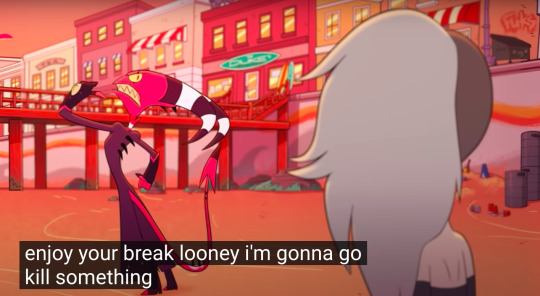
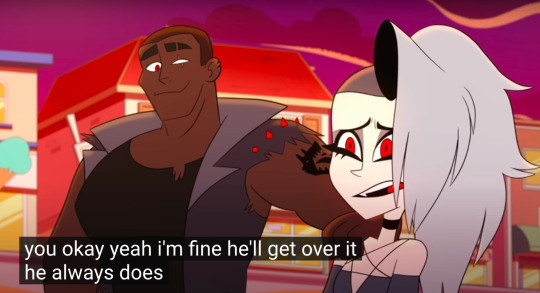
The writers actually use Loona to teach us this about him early on. Loona's not . . . unbothered . . . by her fight with her dad in Spring Broken. But we learn that it's happened before, probably OFTEN, and that it's a pattern. He acts out emotionally- gets angry, irrational, out of control, and then he recovers and gets back to his fun, enthusiastic, determined self.
We get a very similar moment in Queen Bee.
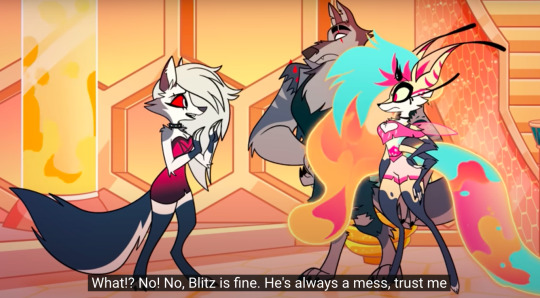
We don't know what conversations they've actually had, but I think that Loona knows very little about the actual sources of Blitz's trauma. But she knows that he's seriously damaged, and at the same time, incredibly resilient.
Probably more importantly, Loona understands that Blitz cares deeply.

I bring out this Truth Seekers moment to point out that Loona knows that Blitz takes the I.M.P. gang's safety seriously and trusts him to make these difficult calls. Where Blitz might often SEEM careless or impulsive, Loona knows that, fundamentally, he's always looking out for his employees and can make reliable decisions for them in life or death situations.
Okay, Seeing Stars.
Look at this look of confusion when Blitz tells Loona that he "might" replace her.

So . . . obviously Loona is pissed off about getting criticism here, but she's shaken out of her rage and utterly baffled when it comes down to the possibility of actually getting fired. Because in their relationship, Blitz is solid. He offers stability in a world where Loona knew nothing of the sort before her adoption. She knows he would never fire her, throw her out, or anything of the sort. And Blitz usually sides with her over Moxxie. So what gives . . .?
Ultimately, once she reflects, Loona has no fear at all that Blitz will abandon her.

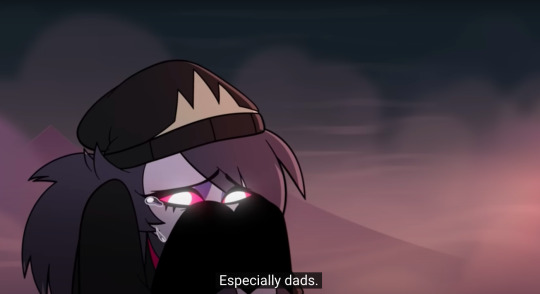
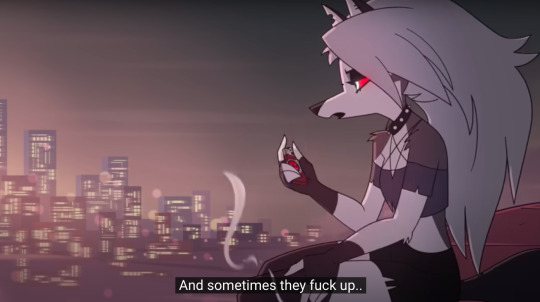

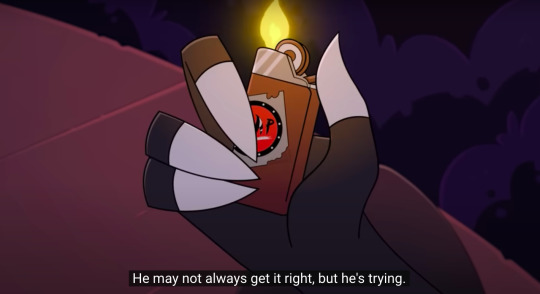
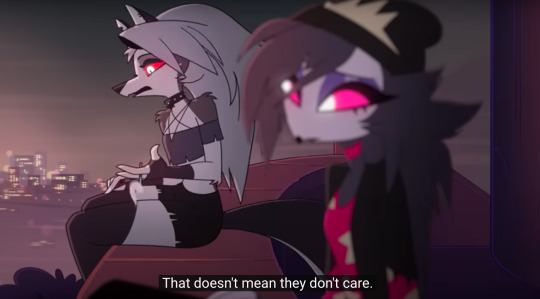
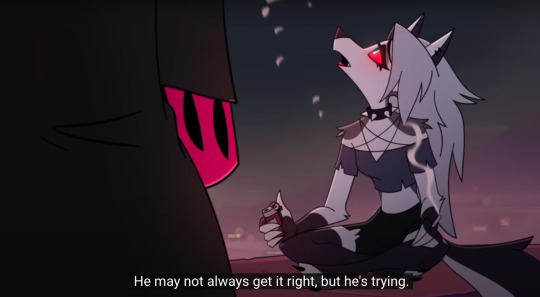
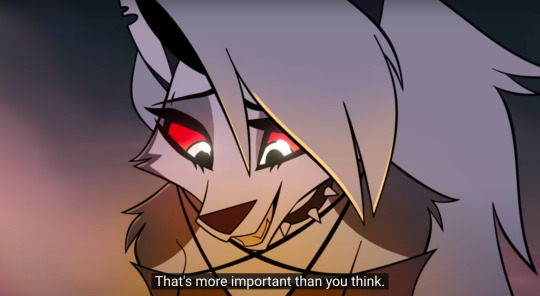
It doesn't get any clearer than this. While Loona gives Octavia advice, she's obviously reflecting on her relationship with Blitz and understanding that beyond all the mistakes and neuroses and fuck-ups and shouting matches, Blitz is truly there for her and that care is not going anywhere.
So . . . what will this mean going forward? I don't know, but my takeaway is this.
Blitz is someone who doesn't necessarily say how he truly feels (more often than not, he avoids it and might not even know himself). He shows how he feels through his actions more than his words. Loona acts fairly annoyed when Blitz makes a show of being affectionate toward her . . . the security Loona feels about Blitz depends on him SHOWING her again and again that his care for her is genuine.
Will she give other characters (M&M? Stolas?) some insights to help them understand Blitz better? It's possible. Or they could look more closely at his actions. Or he could learn to express himself properly . . . that would be a big development. But Loona has definitely helped the audience figure him out.
96 notes
·
View notes
Note
how do you think armand will react to the realization that his godhusbandfather marius is still alive and presumably never bothered to seek armand out in about 500 years?
In my opinion, this is the greatest betrayal of Armand’s life. The abuse was one thing, the trafficking another, but not seeking him out trumps it all. Fundamentally, I think Armand sees love as a contract between two people. You tolerate pain, you even learn to love pain, you learn to love whatever they tell you to love and you love to surrender, and that’s love. In return for that, they choose you. Maybe they also treat you with kindness, or provide you for materially, or stroke your hair gently and hold you, but fundamentally, it’s about being chosen. It’s about sacrificing all these parts of yourself as duty and love and devotion and accepting abuse and mistreatment as self-sacrifice service as the price for devotion from someone else. It’s all “I do this for you, I let you do this to me, and in return, you have to love me.” In Armand’s mind, Marius owes to him to love him. Marius put him through so much. He saved him, he abused him, he turned him. Armand has tolerated? accepted? all of it. And Marius still didn’t go back for him? It’s salt in the wound. How could Marius let him go so easily? How could Marius not love him? How could Marius do all those things and still not love him? How could he do all those things and still not choose him? I don’t really think Armand is psychologically capable of differentiating between love and abuse, because the person he uses as his model of love abused him. Possession, control, punishment, violation, abuse, it’s all part of the shape love takes to him. If someone didn’t love you they wouldn’t bother to cage or hurt you; they’d simply let you go or kill you. You wouldn’t be worth the time or effort to torture or punish or abuse. The love is in the attention, even if it hurts. So Marius not going to look for him is the worst possible betrayal. It’s not love, it’s not abuse, it’s not even hate, it’s indifference. It’s nothing. It would be really painful for him, pain on a level he’s very rarely experienced, despite how much he’s been through.
I think he’d try to rationalize it first. Maybe Marius lost his memory, maybe he was prevented from looking for Armand somehow, maybe he was weakened. Maybe he didn’t look because he thought Armand was better off without him, maybe it was a twisted act of kindness, maybe he was setting him free? No, that can’t be true, because if Marius fucking loved him he would’ve stopped at nothing to retrieve him. He would’ve tried, at least. He would’ve tried. Then it moves to heartbreak, deep, stabbing pain, disappointment and grief and betrayal and hurt and how could you? How could you not? How could you let me go so easily? How could you not love me? How could I mean nothing to you? Then it turns into icy, apocalyptic anger. If Marius doesn’t want him, Marius doesn’t want him. He’ll never see Marius again. Marius is nothing. If it’s done it’s done. This is the end. It’d be a little like that moment of disappointing, crushing clarity all children experience when they realize their parents are pathetic and fallible and not all-knowing or all-forgiving gods. Only broken people who can’t even practice what they preach. It would turn glacial. He’d miss Marius more than life itself, and he always has and I suppose he always will, but that feeling will never again resurface. It’ll be there, somewhere, inside, in private moments, in negative space, but he won’t show it ever again. He’ll be cordial. He’ll be civil. This is his maker. It’s nice to see him. Sure. It’s nice. How’s the weather?
It’s one thing to leave, and another thing entirely to not come back. If he found out firsthand it might actually be possible to see his sanity split like the sky during a thunderstorm as it gets ripped up by lightning. I don’t think he’d react violently. It’d be quiet and terrifying. So much underneath the surface, so much he’s holding back, so much he’s struggling to understand. If he found out firsthand and in private (as in, alone with Marius) I think he’d let Marius explain. He’d still feel all the conflict, but I think he’d look at Marius and wait. Wait for the explanation that’s going to make all of this understandable. Wait for the explanation that’s going to make things go back to how they were. Wait for the explanation that’s going to make him sure Marius loves him. Wait for safety, the comfort, the familiarity. Wait for something that’ll never come and will only ever be a hollow imitation and insult to the real thing that died 5 centuries ago.
#iwtv#interview with the vampire#armand#i really enjoyed answering this#however if i am wrong i will be more upset than i have described armand to be here
158 notes
·
View notes
Note
In an alternate universe where art wasn’t involved in such a toxic situation, what would college art be like as a boyfriend? I’d love to hear your thoughts!
I feel like he’d be open to just about anyone as long as they had a good personality and a good heart. It wouldn’t matter if they played tennis or not; he’d love them for them and hope they’d love him just the same. Idk just some thoughts 💭 😚
Art is the boy that has had a broken heart one too many times and too much shit talked about him for him to run around hurting someone directly on purpose. He is, as far as college athlete relationships go, an exceptional boyfriend.
Art’s major is also Physics. It’s Physics. No arguments.
His girl parties? He’ll show out if it doesn’t ruin his game/practice schedule that weekend. His girl hates parties? They’ll stay in.
As a matter of fact, Art’s probably gonna swing for a girl that’s not a tennis player, but kindly tennis-curious. He likes having someone to teach about the game. And to mutually learn about her world and interests.
He’s probably gonna pull a talker. Art is a talker when he’s with another talker, but he has a hard time with other more reserved folks day in and day out.
Once he starts talking though, Art’s going to keep talking.
The kid knows he has a difficult schedule, but he’s going to want to spend time with his girl. Just the walking between places, having lunch, going to Target, studying, catching a cigarette behind the athletics complex kind of time. Those are the best moments of his day.
Art is going to ask to move into an off-campus apartment with his girl way sooner than is rational. Dealing with thin walls, squeaky lofted beds and roommates doesn’t yield a healthy relationship necessarily.
He loves staying in bed all day with her. Just laying there and chatting.
Unfortunately, he’s a really early riser. Art was conditioned to be. On school days, he’s very oh, yeah, I go up at six, ran a mile and had some toast. You want coffee? There’s some on the counter. Like that’s a normal way to be.
His media comprehension for plots in movies isn’t high. Movie nights are kind of wait, I don’t get why it’s call Ocean’s Eleven. So Art gets a lot of that explained to him and he… likes having the little things explained to him like he’s stupid. It’s funny, because he’s so fucking smart that his girl always wondered if he was faking it for attention…
Art’s dreadful when he’s sick. He’s not gonna try and push through it. He’s going to lay there and be useless when he’s ill. He wants to be taken care of.
Fundamentally supportive. There is nothing Art will not do to help his girl. Nothing.
He’s helpful with STEM-based homework.
Hand-holder. Art likes leading his girl from place to place. Or maybe being led is more apt.
He’s a lost puppy. His biggest flaw is being too loyal. This could result in brash, clinginess. Not all too bad or traumatic.
Art is a realist. So when he fantasizes with his girl about the future, that is what he wants. This relationship isn’t a joke or some game of chase.
This relationship is the thing that gets him fired up. He will stop at nothing to keep it nice through the good and bad times.
(He also understands that not every time is a good time. He will stay through the shitty moments too)
Art is dreamy. He really, truly is.
#ask#art donaldson x reader#art donaldson imagine#art donaldson x you#art donaldson#challengers movie
370 notes
·
View notes
Text
"Canon" Perception: Why MHA's World Building SUCKS!
I figured I'd make this post because it's about time I discussed my views on "Canon" or as I like to call it
The Vanilla-verse
Why?
Because Hori's version of events feel like he opened a choose your own adventure game and clicked the most straight forward options available.
Quirk Awakenings Make No Sense (JJK mentioned)
@bibibbon might like this one.
It's no secret MHA's world building is, lackluster. It feels empty.
Characters not allowed to speak out or back against favored ones, Plot lines dropped, Victims shuffled off to the side.
But where Hori fails most of all is his power system:
But first Jujitsu Kaisen
Similar to Hori, Gege (I hope I spelled that right) also struggles with world building.
Firstly the concept of Cursed Spirits.
Monsters being created from "bad" or negative emotions can work as a concept. But it also heavily depends what is considered bad.
It could allow for the tackling of what makes emotions "bad" and tie in with the shows setting of a restrictive society that forces people to either mold to the pressure or be crushed by it.
Suppressing their true selves and emotions in favor of fitting in with the norm. (to evade social subjugation)
Instead, it demonizes what is a fundamentally intrinsic part of human existence, if nor most sapient life.
It also brings up too many questions that go unanswered: Like the historical implications. If spirits have been around for so long, then why aren't places like Japan (with it's bloody history and bleak present) overrun with then.
Why are spirits trying to replace humanity if humans act as the sole reason for their existance. After all: No Humans = No Cursed Energy = No Sprits
What exactly counts as a "negative" emotion and how much does it take to give birth to a cursed spirit. Stuff like that doesn't seem to have an answer.
[This is also coming from someone who has never interacted with JJK in their life]
Similarly Hori has the same problem with almost every detail in the Vanilla-verse. Stuff like: Eri's bullets, Quirk Singularity, Trigger and so, so much more is never elaborated on.
So pray tell, why did I chose Quirk Awakenings to be the subject of this section.
Because they prove that Hori has no idea what he is doing.
Quirk Awakening or QA's might just he the most frustrating thing in MHA. Doesn't matter if it's in Hori's-verse or someone else's.
It hardly fucking ends well and that's because it's so broad.
Take Himiko's quirk awakening.

At first glance, it seems alright. A tad off but not something to raise hell about.
That is until you look at her quirk.

Transformation is a quirk that relies on blood to work, Himiko cannot copy quirks partially because quirks are stored in the DNA of an individual and Transform can only copy the outward appearance of a person.
She needs to learn the individuals mannerisms and habits on her own, she doesn't achieve those by the default of her quirk.
(The same could be argued for her voice, it would be much more impressive if she trained it)
It would make much more sense then, for the evolution of her quirk to allow her to better mimic people. Expanding the scope of who and what she could change into and how accurately she could become a subject.
It also would fit the theme of 'becoming who you love' with the saying 'imitation is the sincerest form of flattery'
Instead, though. Hori decided to make her AFO lite and it is broken.
If she copies AFO, does she obtain his quirks?
Would her quirk awakening account for other quirk awakenings. Say she transforms into Shigaraki would she be as strong as him post MVA or would she be stuck with USJ-level Decay?
Ignoring the blatant retcon-ex machina of it being dependent on Himiko's connection (not like it mattered during the Forest Camp Raid!), It is massively over powered and it doesn't fit Himiko's themes.
Now, let's look at Twice.
Twice's quirk (Double) allows him to produce identical copies of anyone through a sludge like substance that excretes from the palms of both his hands.
Each copy is a little weaker than the original, if a copy makes a copy then that fragility doubles.
Twice's quirk is ties to his character by his trauma. To the point he's so fearful of turning to sludge, that he actively goes out of his way to avoid conflict.
This guy had to watch himself kill himself, clone against clone and until MVA, Twice isn't even sure he's the original.
Twice's quirk awakening works.
It works solely because of Twice's character and themes, it simply fits.
It makes sense, Twice was so traumatized that he actively suppressed a part of himself and by breaking through that barrier he can begin to grow stronger by accepting himself.
Twice's quirk awakening works because the peice were always there. It wasn't that Twice pulled this out of his ass, he earned it.
He not only unlocked a part of himself, he came back stronger. In this way the formula works
Quirk + Effort/ Character Growth = Stronger Quirk.
Rather than replace or rebuild, Twice's QA works with what was already present and it comes off wonderfully.
I wish I could say the same for our next "challenger"
I have plenty of complaints about Shigaraki as a character, plenty.
His quirk awakening is certainly up there, not on the top. But it's up there.
It takes the weaker aspects of what I mentioned above and uses it as a crutch.
Besides Shigaraki remembering and accepting his past, this QA has nothing going for it.
It's almost boring.
There's only so much you can do with a quirk like Decay.
All it does is expand the speed and radius. And while that works for what Decay is, a quirk made to destroy things. It's really boring from a story perspective.
Seeing Deika and later Jaku was cool, but just that, cool. It only really served to push things forward and what it pushed was horrendous.
Stepping away from the narrative side, let's discuss the In-Universe side.
Post MVA Decay has two advantages. It spreads really fast and it makes things explode:
So why doesn't it work like Twice's did?
Themes. Nothing about Shigaraki's QA ties in with the themes expressed in MVA.
As the protagonist of the arc, we should feel a connection with Shigaraki, but we never do. Mainly because we don't get that much time with him.
Besided the bonding he does with the LOV we are given little reason as to why Shigaraki ticks like he does, there's little to no theme-ing with Shigaraki.
Doctor Garaki says it best with this line:
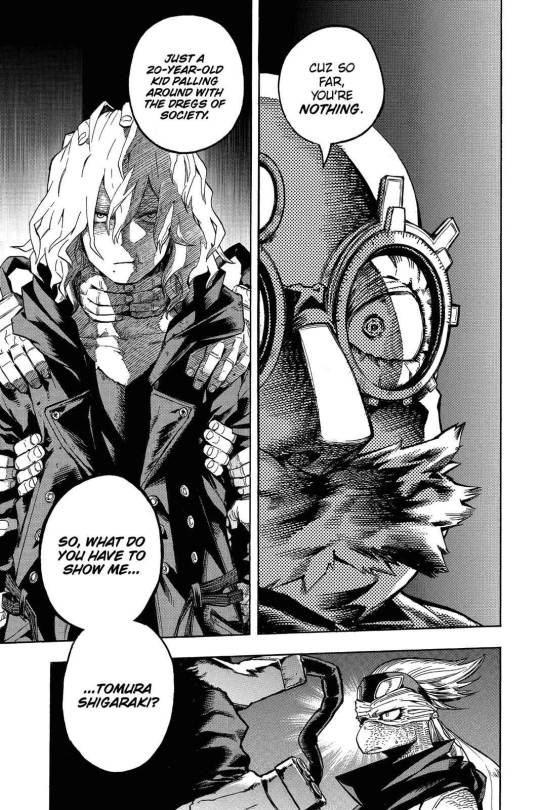
What does Shigaraki have to show us outside of his past and the PLF.
Hardly anything.
We know he's an avid gamer and likes to destroy things.
That's it.
Even Magne had something before she died, somekind of concrete goal that aligned with her character.
Tomura has nothing we can attach that to and as such his QA falls flat.
And this set the standard for every other quirk awakening in the series, no I'm not counting that monstrosity Hori bulled with Bakugo .
Uraraka's, Midoriya's, Shoto's (implied) Awakening, they all fall flat because they don't match the themes that were set literal years ago. Hori doesn't know how QA work despite having written them.
If your at the point where you, as a writer, don't understand your own in-universe system. Then maybe it's time you take away some stuff.
Why Shigaraki fails as a antagonist (featuring: Nine and Hana)
I already brushed the surface of this topic in the last segment. I'll elaborate on it here.
Shigaraki sucks as an antagonist. I don't like to use Reddit due to the attitudes on there but had found something while looking for information.
I managed to find a post that I think sums up my issues with Shigaraki pretty well, even if I don't agree the rest of the post (mainly blaming Shigaraki for Hori's failures)
The main one being what is the LOV even doing?
Spinner brings up a good point why do they even follow Shigaraki, what can he provide them as a leader that they can't get by sticking it out on their own.
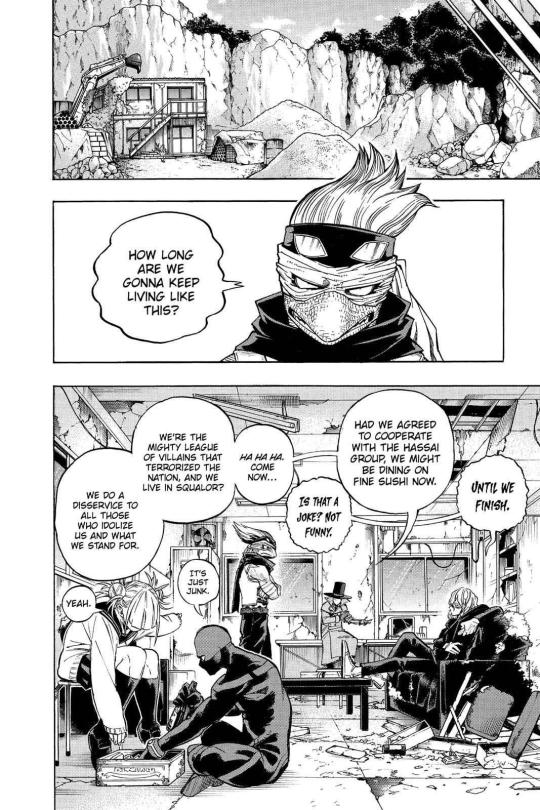
Shigaraki is spoon fed practically everything and once you notice, it kills any possibility of him being taken seriously.
Let's see:
Dabi, Himiko: brought in by Giran, AFO's associate.
Spinner, Mangne, Compress: Came aboard under the false pretense that Shigaraki had cooperated with Stain.
Gigantomechia: Kurogiri has to draw him out, gets arrested while doing so.
The MLA: Has to gain a quirk awakening just to match ReDestro's output and ReDestro hands him the keys almost immediately. Only reason the merger happens is because ReDestro and Spinner planned it.
Every single goddamn thing in this story is because of factors external to Shigaraki. He literally stands around until Garaki gives him a new quest-line like a fucking Bethesda NPC.
It was understandable in the USJ because Shigaraki needed to be introduced. He was at his base form and needed to grow, except that growth never happens.
The story just dances around him, he doesn't need to try because Hori will just force things to happen.
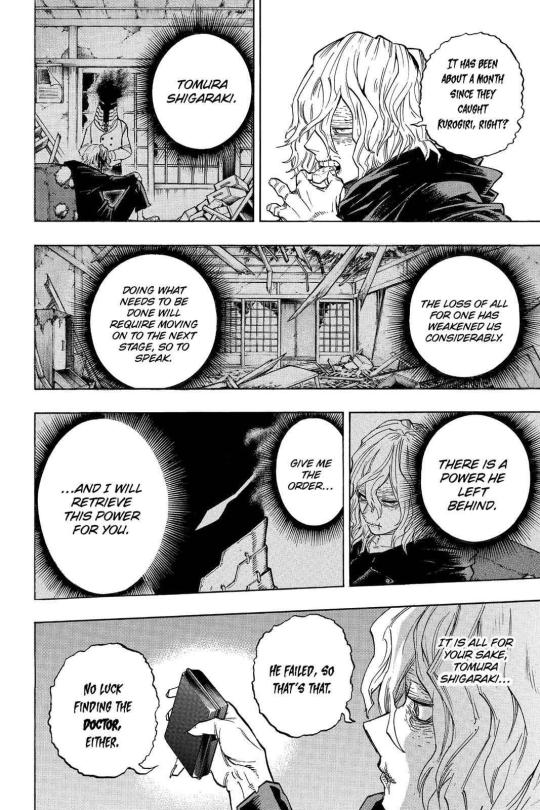
The entire Jaku arc is him throwing a tantrum and the benefits just falling onto his lap. It is sheer luck that the public made that correlation.
Because the Nomu's behavior don't line up at all with Stains ideals. Nor does Shigaraki's "philosophy", and that was what partly triggered the whole Hosu arc in the first place!
Realistically nearly every member of the LOV should have turned tail the moment they met Shigaraki in person and spent time with him for over five minutes.
The LOV only exists and works because Shigaraki takes the backseat.
The entire Camp Raid, the focus is on everyone but Shigaraki who does fuck-all until Bakugo gets captured and we see him at the bar.
You could pluck Shigaraki from the arc and nothing would change because the central focus was on Dabi and the Vanguard Action Squad. How is anyone supposed to take Shigaraki seriously, when he is second fiddle to his own team.
And it's pretty much the same in the Overhaul Arc what does he direct contribute?
Again, nothing. I've heard the term 'Talk no jujitsu' used and it perfectly encapsulates his response to Himiko's anger.

No one in the LOV has any reason to believe him, to put faith in him because the fuck up was so colossal.
Let's review:
Shigaraki knew someone (someone important, a villain) was coming, made no plan if things went south. Dabi had actually left the base to recruit on Shigaraki's orders! Meaning that Shigaraki is primarily to blame for the casualties dealt during this fight.
Already bad, but maybe he does something to reaffirm their belief in him as a leader. Nope.
His revenge plan hinged on Overhaul not deciding to kill two of his team members on a whim, or use them as bargaining chips. Sends them directly into enemy territory with no resources.

Put his teammates on a position where they are forced to kill a hero in order to evade capture, making them a priority target for society at large* and further pushing them away from possible resources. (*A society, mind you that openly mutilates and kills outlaws)
His relationship with his team members is near non existant: from the Reddit Post
Spinner. Shigaraki plays videogames with him off-screen. Never even shows any concern for his whereabouts after Spinner starts losing his mind and almost goes full Nomu off of his quirks.
Kurogiri. Shigaraki never shows any wonder or comment as to Kurogiri's presence, despite the fact that Kurogiri was his babysitter for a long time and he apparently missed him after his capture.
Mr. Compress. Shigaraki never shows any wonder or concern as to his capture.
Dabi. Shigaraki never interacts with him in any way that suggests real friendship.
Toga. Shigaraki never interacts with her in any way that suggests real friendship.
Twice. Shigaraki never shows any kind of wonder or any concern as to his death.
Magne. Shigaraki never interacts with her in a way that suggests real friendship. Side Note: he never really reacts to her death either.
Y'wanna know who does have a relationship with his team?
Nine:
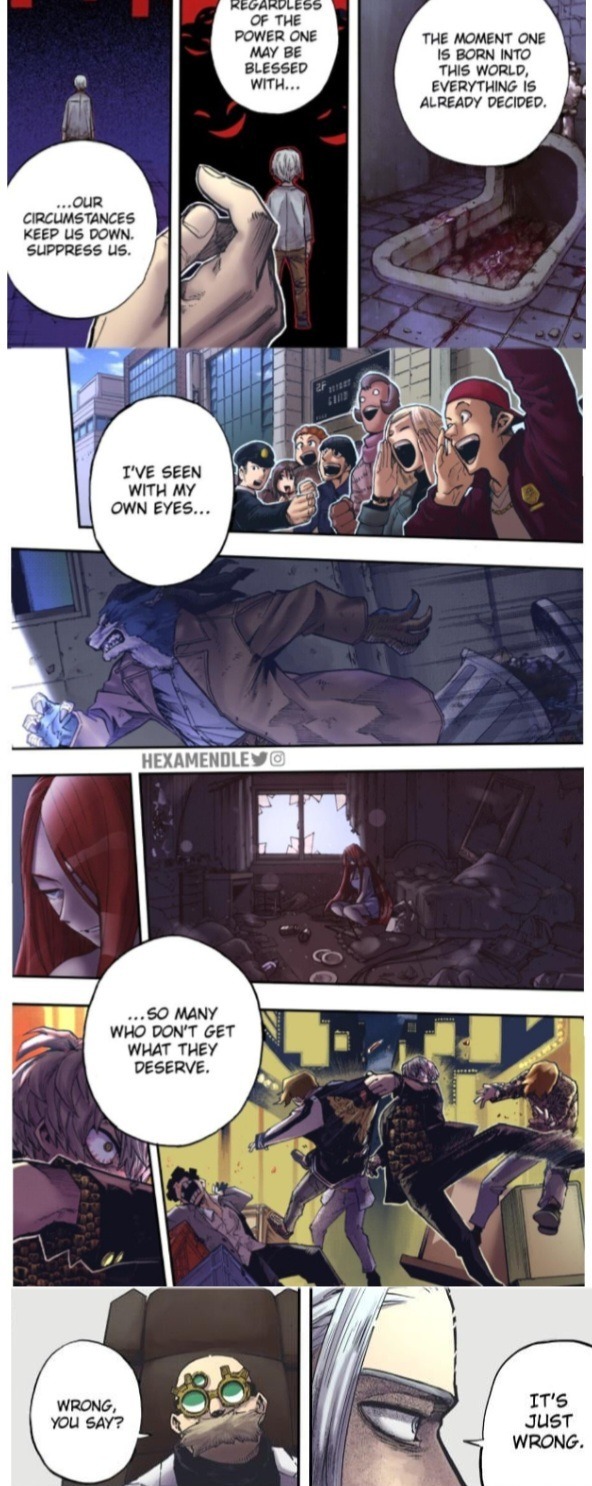
Nine might be one of the few characters Hori has ever created that managed to make me give a shit about them outside of alternative (or fanon) materials.
He is everything Shigaraki tried to be as a character:
A solid goal: To create an ideal world for his allies and himself where their idea of the 'strongest' rule.
Connections: Everything Nine does, he does himself. His teammates ate intertwined with hin through their history, he actually saved Chimera's life and it's implied he also did this for Slice and Mummy.
Effort: Nine puts himself in harms way numerous times for the sake of his allies and their mission. He even goes through with Garaki's experiments knowing he will likely wind up as the experiment himself.
Nine is phenomenal for what he was: A character from a spinoff movie.
youtube
And then he was killed.
God Fucking Damn it Hori.
===============================
Something that always bothered me about the defaced All Might statue was the laziness of it all.
In a way it reflected the direction MHA was headed, headlong into a kerosene coatdd dumpster.
I Am Not Here.
That's the best thing you could come up with? The falling action of the Arc and all you could conjure was that!?
When MHA ended, I said no, no fuck that and began putting some of the concepts I had made during MHA's decline to good use.
The logical conclusions went into Crownless Monarchy. Which serves as a continuation to what Hori failed for finish.
The rest?
The rest had been going into a side project of mine called:
I Am Nowhere
Or Nowhere for short.
Total Timeline Derailment is a phenomenon I noticed pop up in specfic works.
It occurs when an author throws out all stages of canon in favor of crafting their own story and shedding the limitations of the source material.
The story of Nowhere starts off modestly, following an alternative line of events where Hana's quirk causes a much larger scale massacre upon it's blossoming and the expands to show just how different this universe really is.
Such changes include: Hana's quirk being named and shown:
Soundwave: evolution of Nana's quirk and takes inspiration from Hana's name meaning (Flower)
Present Mic and Jirou losing their quirks in their youth (or as an infant in Jirou's case)
Himiko's parents making a deal with the Symbol of Evil himself.
Expanding upon Doctor Garaki's past and friendship with AFO.
The Yakuza going a different route (Overhual gets a new brother)
An alternate USJ: Christmas came early
AFO and Garaki both having successors.
And a ton of other things I need to flesh out more!
One may wonder what this has to do with my critiques on Hori's canon.
Besides being a pitch of sorts, this allows me to elaborate on how Hori seems to make mistakes one wouldn't expect of someone with as many years under the belt as Hori.
The one thing Hori always forgets is consequences. In Nowhere, Consequences are everywhere.
Enji shipping Rei off to the mental ward to cover up his abuse?
AFO takes interest and decides to pull some strings to get Rei transferred to Jaku General.
UA slacks on security?
Ok! Just let Hana bring Warmonger (USJ Nomu) along and have her kill Thirteen and nearly kill All Might in the same hour. Oh, and Himiko is playing the insider (of her own volition)
Bakugo rejects Midoriya's hand?
His abuses attract the attention of the Pale Sculptor herself, leading to him loosing both his parents in a "gas leak" ignited when Marsaru clapped his hands and caused an mini explosion to occur. [They get Rei's version of Nomufication] setting Nomufication forward by a decade in the process.
Ideally this story won't leave things out. Speaking of that I have one last thing to discuss
The whole debacle with the Winged Nomu and how some people don't know that it's apparently supposed to be Tsubasa
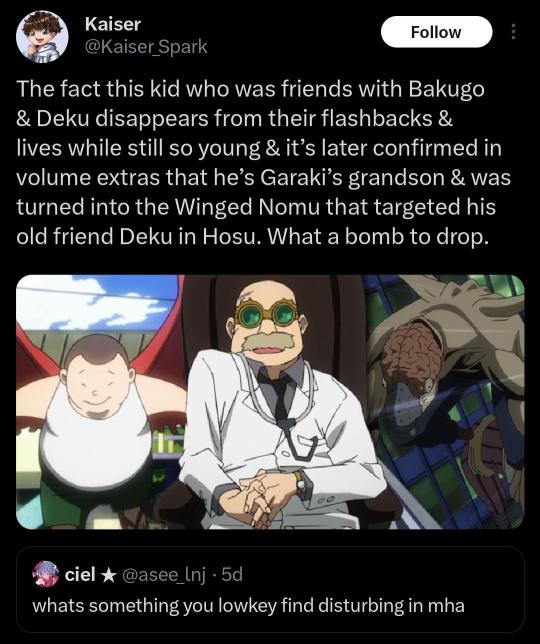
(yk the obscure character who only shows up twice and who we didn't get a name for until said reveal)
"What a Bomb to Drop", yeah it would have been better to "drop" it without needing to cram it into volume extras.
That right there is what gets me about Hori's writing, the lack of storytelling.
We shouldn't have an entirety different series just to understand why a character is they way they are (I'm looking at you Oboro)
I will say Vigilantes is leagues above it's parent series, even with the glaring flaws that plauge it.
Moral of the story: LEARN TO WRITE!
#bnha critical#bnha rewrite#anti mha ending#mha ewe#mha critical#anti horikoshi#anti aizawa#anti endeavor#anti enji todoroki#anti bakugo katsuki#anti bakugou#shigaraki critical
84 notes
·
View notes
Note
when they've got interpreting spiderman noir under a specific cultural lens at the function [picture of me going insane]
I cant help myself.. what can i say. And since you've mentioned some research going on behind the scenes.. do you have any fun interpretations? Or even anything fun about the 1800s!
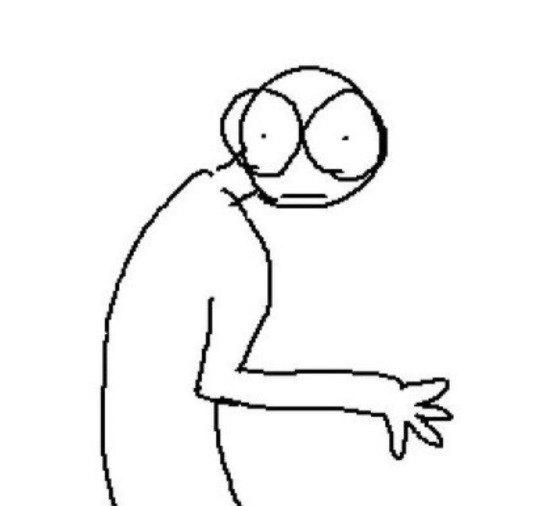
OH HI
Hm. I don't have anything as fun as historical dancing, but I suppose this does give me the excuse (thabk u) to blab about Noir's childishness.
(wow putting this under the cut bc it got longer than I thought it would LMAO)
I think what a lot of people (including Noir's contemporary writers and yes even the spiderverse interpretation) fall for when trying to read Noir's character is the imitation of his idea of what an adult is, that he hides behind. Like Noir's persona is incredibly exaggerated. He's playing pretend. Look here, he's practicing.

A lot of his persona as Noir is imitation! Imitation of his uncle, of Urich, of the violence he's been exposed to. He's running around in his uncle's old uniform. Fundamentally misunderstanding WHY his uncle had been ashamed of it and his role in the war.

And then he goes ahead and steals Urich's alias because it sounds Cool (which is such a teenage thing to do jesus christ).

But like that imitation of The Adult isn't something that's limited to that exaggerated persona that Noir encapsulates. Peter himself is trying So Hard to be grown up and tough and responsible that it loops back around to him being a brat who would try the three guys in a trench coat trick. He even gets beat up for it when trying to defend his aunt. And I mean I've posted about him being a brat.
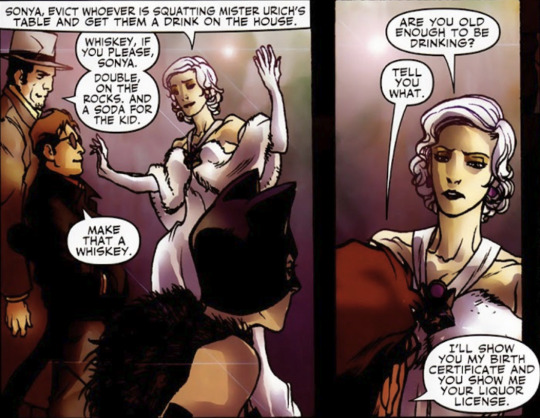
About how he looks at Urich as a Prime Example of what a strong and knowledgeable adult is (which is part of why he reacts so volatile in response to Urich showing he's not exactly as morally righteous as himself, he's wounded and let down). Whiskey? Whiskey sounds like someone Mature and Cool would drink, I'll have it too. And then proceeds to throw his drink at Osborn and laugh about it. The illusion was broken for me then.

But well it's not broken for everyone. I mean like obviously I poked at the contemporary writers, but I'm more talking about the other characters in the narrative. Mainly Urich and Felicia.

Urich taking Peter under his wing isn't entirely under the motivation to nurture Peter. I think it Becomes that, but he's really envious of that kid. He wants to see him lose that hope that he once had (ruh roh the opposite thing happened, being around the kid made YOU more hopeful Ben. Guess you gotta be good. Hope you don't die now).
Urich really is exposing him to an extremely harsh reality, and taking him places where adults are typically only allowed. He's letting Peter get a glimpse into what it's like, which will eventually enable Noir's tool of violence. All these tests will accumulate into what Peter thinks someone powerful and strong can be and do.

Then his problematic relationship with Felicia (writers I'm malleting you for this). He's clinging to her adulthood and the safety she represents, and he's young but she sees some adult strength in him. I mean she trusts him with the blackmail Urich gave her, which she really. Shouldn't, even if that's what Urich wanted.
Anyway, strength is something she's been consistently drawn to her in her partners. Strength to feel as her own. Even if it's to hers and others' detriment. There's also a part of Peter that's drawn to Felicia because Urich was. He's still honing in the good parts of Urich he wants to be.


I think the one person in the narrative who doesn't fall for it? Is Aunt May. You could argue it's just her being naturally motherly, but for someone who was about to be eaten alive she's pretty frank with Noir. I think she can see that that violence and exaggerated grittiness comes from someone inexperienced and young. Even if she can't consciously recognize the similarities between Noir's persona and Peter's protectiveness of her. I don't think she wants to see that. I actually have a short comic script about that, but it probably will never see the light of day.


Ugh he's like a cat puffing up to scare away a predator. It's fake!!!!! It's all fake!!!!!! He gets intimidated by JJ, he never ties his shoes, gets powers and then immediately guns to beat the shit out of Osborn, sings about the sandman when he's getting his face bashed in, crawls to Felicia all pathetic and sad, and he made a costume to run over roofs at night in.
And it's funny how he's forcing himself to grow up, but also really sad because all the things he's being exposed to is already forcing him to grow up. He's witnessing things no kid should ever see or experience.
Then there's the time period to consider. The aftermath of WWI, being in the midst of the Great Depression, and WWII just around the corner. He's faced incredible hardship and is going to continue to face so much hardship, and he's going to mature faster than he ever should have. It should have made him crash and burn Hard when he became an adult, and to me he still does because I'm ignoring everyone after ewaof LMAO.
As for my research on the 1800s NY that's for my own spider iteration run I'm working on, so not too related to Noir until I reach the 30's :3
Hope that was satisfying!!
#tw grooming#critter talks#asks#the moots#fool!!!!!!#spider man noir#character analysis#abt the research like logically I know the typical new yorker isn't gonna know abt the specificities of the original dutch colony#and intricacies that the boom of industrialization had on lower class communities#but it's less about that and more of digging my hands into the Soul of NY#because NY is so Intertwined with any spider#so I'm starting from the Very beginning and digging my way up. man y'all were a hot mess#it's really fascinating though working my way through documentaries and books. the list is long and the dent I've made is about an 8th ASDF#anyway MAYBE y'all will see spiderman undiscovered one day...ask me abt it again if y'all like miles being a detective w a shoulder demon#for now it's me my 55 of world building slides several character note docs and a to read list of about 20 books long#would like to go to NY citay one day & oogle at the stinky subway draw some storefronts and people watch but thats not in the budget rn#also trying to look for movies n shows that aren't exaggerations of the culture so if anyone has recommendations DO @ me please#wanna do her justice bc I care about her#ALSO FOOL I'M SO SORRY FOR TAKING A DAY TO ANSWER#had to get my thoughts togther
117 notes
·
View notes
Text
Agatha all along theories
Theory 1: Unlike what was said during production Teen is actually Agatha’s son the one she “sacrificed” but it wasn’t her that sacrificed him but someone else, someone from her previous coven perhaps?
Evidence: a) Agatha seems to be instinctively protective of him, unusually so for how fundamentally selfish she can be. She puts herself bodily between him and the rest of the coven when they start trying to figure out the sigil and the thing that finally gets her to drink the poison is him threatening to do it. Then when they escape the flooding house, she lets him escape before she does.
b) Agatha seems genuinely upset and then horrified during her hallucination of the crying baby in a cradle that turns into the book of the damned. Plus in her hallucination tv show, the loss of her son seems to be a genuine burden on her.
c) Teen first appears having broken into Agatha’s son’s “room”
Non-evidence: I just think it would be more interesting if Agatha is the mother
Theory 2: Teen is Agatha’s son, and she did sacrifice him to get the book of the damned
She regrets it now (because she is horrified and feels her son’s absence as a loss) but still did it.
This will be revealed to Teen at the end of the show, leading to him feeling betrayed by the witch he idolised to go down a typical Marvel™️ anti-hero revenge arc, because while we would all love the end of this story to be a strong found family coven story, Marvel doesn’t ever give us Found Families that last, and I think it would be both interesting and on brand for Marvel to make it seem like we are going to get found family and redeemed Agatha, only for the rug to be pulled and Teen to realise that his found mother (who is his actual mother) sacrificed him for power.
Theory 2a: Agatha is Teen’s mother, and she didn’t sacrifice him for the book of the damned but he thinks she did, so that we get the tired tropes of miscommunication and betrayal altogether, and Marvel gets their typical “found family disrupted by betrayal” story without any of these protagonists being the villain.
#agatha all along#Agatha all along spoilers#Agatha all along theories#agatha harkness#Agatha harkness & Teen#teen agatha all along
60 notes
·
View notes
Text
Mulder’s Depressed Vampire Sex: Me on 3
You know, I like the episode 3. I mean, not the casefile part of 3, which is whatever whatever, but the important part: the blood fetishist lady has her way with Mulder and then he cries.
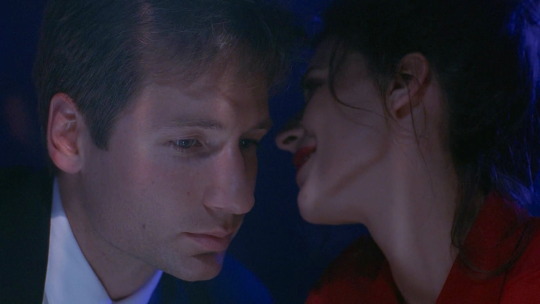
I definitely loathed the episode back when the show was airing. Back then it seemed like it was intentionally hostile to the ship—like going out of its way to be hostile, having Kristen tell Mulder shit like “I can tell you’re missing someone, but attention please: just a friend. Definitely not more!!!” I honestly kind of felt like she was looking out of the screen directly at me when she said it.
But looking back, knowing that MSR was endgame (and that fans kinda took over the narrative anyway), I definitely see the episode totally differently.
From a Mulder character arc point of view, this episode is all about him being a sad, sad boy. It is all about his depression, his hopelessness, his grief for Scully. It’s also about his drive to try to save women and girls in order to save himself. And he so often seems to fail at this when it is someone he cares about (or even when it is someone he has a fleeting connection with, like Kristen). And that’s so, so devastating for him. In that sense, this episode is a really desperate expression of his grief and frustration.
The HIV/AIDS angle to this ep is super important, too, so we have to make sure we’re getting into the full 1994 mindset on this. Mulder says in alarm to Kristen back in the club, when she’s playing fast and loose with blood: “AIDS. Aren’t you afraid?” (To which she responds that she wants to die.) Mulder knows that HIV transmission through sharing fluids is no joke in 1994 (it probably really shouldn’t be now either, but that’s not today’s lecture). Yet later, when Kristen is shaving him and he’s nicked, he allows this to be the catalyst for sex, even as he makes attempts to stop her from tasting his blood.
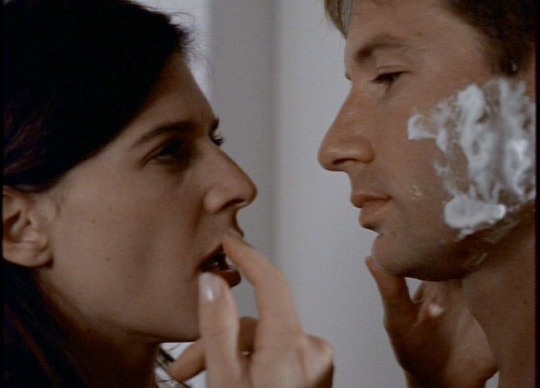
So his choice to have sex with Kristen is depicted as reckless, with someone who has been shown being careless about HIV. And he is doing it not just because he is turned on, but because he is being intentionally reckless with himself, clearly knowing the consequences. He shows concern for her, yes, but he’s also self destructive. He wants to fuck the hot vampire, but he also wants to fuck with death.
In other words, there’s a difference between what the episode tells us about Mulder’s relationship to Scully and what it shows us. And what the episode shows us about their relationship is that Scully is central enough in his life that everything is fundamentally affected by her abduction. He’s broken. He’s visibly depressed. He makes decisions that risk his job and his life. All the while he is actually choosing to wear her cross: a symbol that traditionally wards off vampires, as Kristen observes, but also keeps Scully’s presence in his mind constantly and in every frame of the episode he's in. And the episode ends with him looking like a hero in a romance novel mournfully casting his eyes to the hills clutching her cross in his hand.
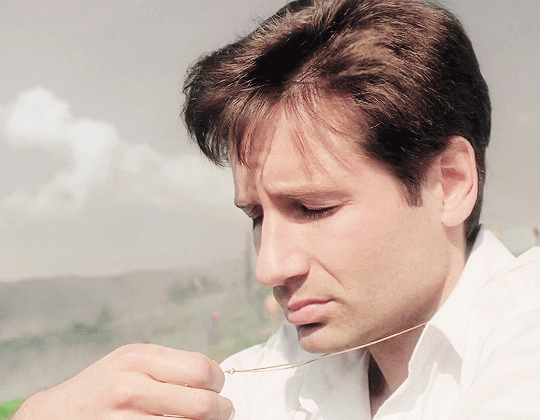
None of this obviously communicates “I miss my work friend,” right? No objective observer would see this and say, “ah, he clearly is missing someone—most likely a friend, I would say.” But probably that’s exactly why they included Kristen’s “just a friend” line. They knew his grief in this episode was reading very powerfully, and they didn’t want it to seem overtly romantic.
I also feel like it’s kind of significant that the only time we actually see Mulder have confirmed sex with someone (besides Scully later) is when he’s depressed and Scully is gone. Linking his grief for Scully to his very-rarely-seen acting out on sexual desire like this also seems kind of psychologically sus to me, but I don’t know, I read a lot of fanfic.
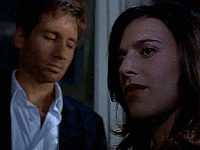
Speaking of which, I did a little fanfic search for 3. And unless I am missing obvious fics (always a possibility), it was kind of difficult. Partly because this is a stupidly hard episode to look in search engines for. (No one should ever name episodes after numbers, although this one I will forgive because it’s from 1994 and they couldn’t have fully understood about Google and AO3.)
But also I just think there hasn’t been a ton of 3 fanfic, probably because this episode isn’t very well-liked. And listen, I get that Scully isn’t in it, which is often unappealing for writers, and there is Mulder/other, which people don’t like. But I feel like there are a lot of possibilities for story ideas here that don’t necessarily take place during the events of the episode. Like: how does it affect them later? Personally I like fics where Mulder and Scully discuss the events of the episode long after (actually I wrote one, which I included in my recs because I’m not that cool). I also think Mulder’s angst and depression has a lot of ways it could go—not to mention it’s the last canonically confirmed time he has sex before like 2000 or something. And it seems like AU takes on what happened to Kristen could be interesting. So what I'm saying is: maybe try writing 3 fics.
3 Fanfic Recs
Three is a Crowd - wendelah1 Mulder has sex with Kristen but can’t stop thinking of Scully.
Analgesic- settledownfrohike Mulder has sex with Kristen but can’t stop being a self-loathing, self-destructive mess. And thinking of Scully.
The Woman In His Heart - Spangle This shorter piece frames Mulder’s time with Kristen as a revelation about his feelings. Angsty and nicely observed. A 2005 Spooky winner, evidently.
False Dawn - emmbright A sharply etched portrait of how Mulder moves through his life between 3 and One Breath. For me this fills in the blanks perfectly.
Dreams - Characteristically_Exuberant This is actually a (great) post-ep for Field Trip, and the events of 3 aren’t the main focus of the fic. But I like how this author discusses what happened with Mulder in that episode and contextualizes it for both agents.
We’re Not Here To Get Involved In Personal Problems - cecily_sass This is mine, also not really a 3 post-ep; it’s an X-Cops post-ep. I feel a little silly including it. But I had them discuss the events of 3 in this fic in a way that sort of lays out my own thesis of the episode, and I thought, hey, it’s my list. Mulder and Scully walk to a gas station in Willow Park in Los Angeles the morning after X-Cops; they discuss plenty.
Any others? I feel like I probably missed some.
#the x files#3 episode#fox mulder#Kristen kilar#Scully abduction arc#x files fanfic#season 2 X-files#xf season 2#meta
146 notes
·
View notes
Note
Out of curiosity, what makes you feel drawn to Zutara as a lesbian. Is it still relatable to you?
It does feel relatable to me. Obviously it’s a heterosexual relationship, but given the lack of good and complete representation of lesbian relationships in the media, I still gravitate towards certain aspects of romances like this.
There are many reasons why, but before I get into it, I want to preface this by saying that the point of this is not to say that Zutara is “lesbian coded” or anything like that so please don’t construe it that way. It’s a heterosexual relationship, period. All I’m saying here is what I, personally, enjoy about it as a lesbian.
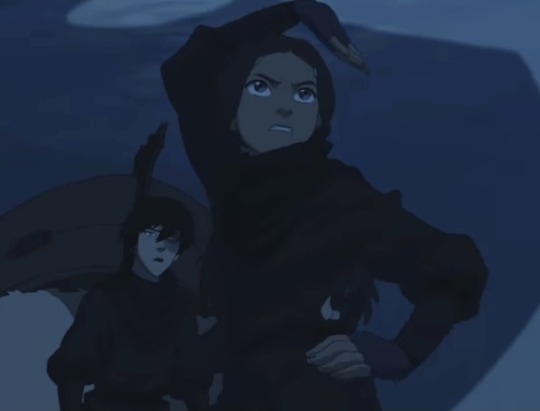
The biggest reason I like it is because it represents female desire to me. I know the BoyMom and Pick-Me brigade hates that I’ve described Zutara that way in the past—but it’s true and I stand by it. That is the reason why Zutara became so popular and why its fanon narrative is almost entirely driven by female fans. It directly reflects their desire in a romance and what Katara’s canon one was lacking.
I honestly didn’t have strong feelings about Zutara until I saw the backlash it received. The narrative and the fans both treat Katara as if getting with anyone besides Aang makes her selfish, or that she’s neglecting some kind of duty by doing so. Katara’s voice and desire is fundamentally unimportant to the writers, because they always focused on Aang’s feelings over hers, and even though fans try to pretend otherwise, the dominant narrative surrounding this relationship has always been about Aang. How he needs airbending children, how his heart would be broken if she left, how he needs her to rebuild, etc.
And from Katara’s side, even though she never shows that she shares Aang’s level of interest, fans insist on reading in signs that aren’t really there. They also focus on logical reasons why they’d work. Aang is nice, he’s fun, he’s a prodigy like Katara, both have suffered in the war, etc. At first glance, it seems like a good match…but we never actually see the writing demonstrate how they actually connect over any of these things.
Good in theory, but bland and passionless in reality.
That narrative resonated with me in a bad way, because it’s exactly how I’ve felt as a lesbian. It reflects the pressures I’ve felt to put aside my desire for love to date a man instead. I’ve been told to my face that it’s selfish for me to “choose” another woman—a person I actually desire—over a man.
“What about children?”
“This is going to make your life so much more difficult!”
“Think of your family!”
“Jakey is such a nice guy, can’t you just give him a chance?”
“You have so many interests in common with Jakey and he has a good job! Why won’t you go out with him? It makes so much sense!”
“You’re so shallow, being fixated on looks. What if your perfect match comes along, but he’s male? Would you really say no?”
“You only want that because you’re a pervert. You need to stop being so obsessed with sex and think about the person instead.”
It’s eerily familiar, that’s all I’m saying. A lot of these ideas are used to attack Zutara and its fans nearly verbatim.
Katara isn’t a lesbian, but like a lesbian, Katara in the context of Zutara commits the crime of marrying for love and desire over duty. Some people see that as an evil act of selfishness, but to me, it’s just love.
We can’t control who we love, and I like to see the narrative of a female character breaking free from the social expectations placed on her to pursue it. No; Zuko isn’t the “safe” option, their relationship would be heavily criticized, and it could even endanger them. But that relationship is one they both feel passion for, and together, they would draw power from one another and use it for good. Their love and connection is powerful, and they would have fought hard for it. Because love is worth fighting for.
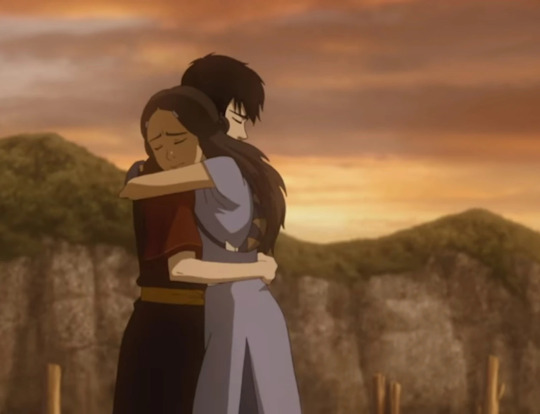
That’s deeply admirable to me, and an empowering narrative when I think about how I’m inevitably going to have to fight hard for any love of mine. But it’s worth it to me—it’s always worth it.
#zutara#atla#avatar the last airbender#katara#zuko#canon critical#lesbian#ask#anon#fandom salt#anti kataang
83 notes
·
View notes